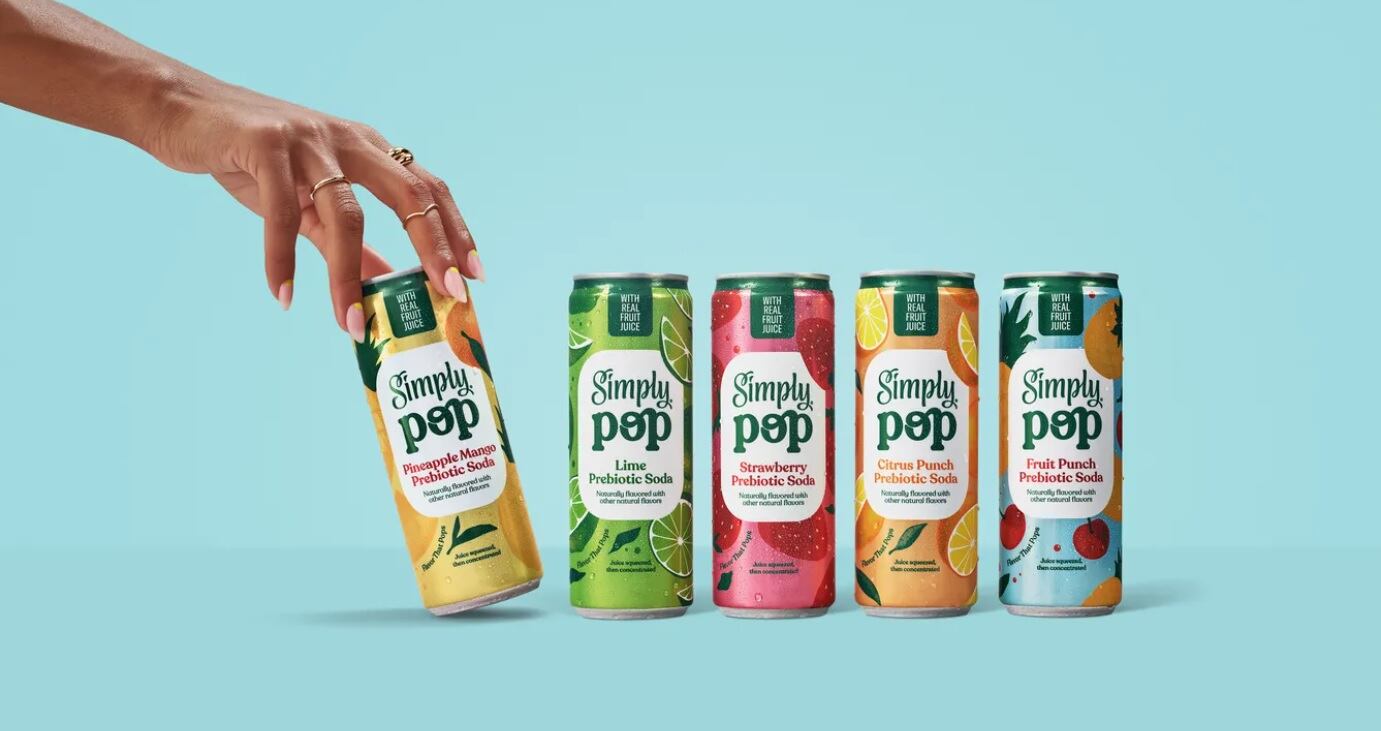This week, PepsiCo announced it has completed its high-profile acquisition of Poppi: maneuvering the soda giant further into the functional beverage space. With the paperwork done, PepsiCo will move fast to start scaling Poppi’s momentum and unlock new growth opportunities offered by PepsiCo’s might and muscle.
Coca-Cola, meanwhile, is taking a different approach and launching its own functional beverage competitor, Simply Pop. This fruit-forward line of beverages with prebiotic fiber to support gut health is now gathering pace on the role-out across the US, having debuted in February.
They’re jumping in on a market already buzzing with Olipop, Culture Pop, Wildwonder, Turveda and more.
The battle lines have been drawn. Is this a new era in the soda wars?
Not your father’s soda
Everyone knows Coca-Cola and PepsiCo for traditional soda.
Whether that’s in sugar or diet form, it’s a category that’s increasingly drawn skepticism from consumers for high sugar content or artificial sweeteners.
Both beverage giants have been diversifying beyond soda, with brands in more promising categories such as sports drinks (PepsiCo’s Gatorade and Coca-Cola’s Powerade/Bodyarmor) water (Coca-Cola’s Smartwater, PepsiCo’s Aquafina), coffee (Coca-Cola’s Costa Coffee and PepsiCo’s Starbucks) and RTD tea (Coca-Cola’s Fuze Tea, PepsiCo’s Lipton).
And now, they’re looking at the next big thing: gut health.
Coca-Cola uses existing brand equity with Simply Pop launch
Coca-Cola has decided to launch its prebiotic bet under its Simply brand: which already houses a portfolio of juices, lemonades and smoothies.
That allows it to leverage existing brand equity of products and helps it reach health-conscious consumers who are ‘curious about prebiotic sodas but who haven’t yet taken the leap’.
The Simply brand has expanded to more than 20 varieties of juices, lemonades, smoothies and juice drinks since its launch in 2001.
Tying into that brand equity, Simply Pop will launch with five flavors already familiar to Simply fans: strawberry, pineapple mango, fruit punch, lime and citrus punch.

That - according to The Coca-Cola Company’s CEO of Nutrition - creates a ‘perfect balance of innovation and trust’ to bring new consumers into the category.
Simply Pop has now made its debut at retailers in select regions of the US and online via Amazon, with a wider rollout set to follow.
PepsiCo goes the M&A route
PepsiCo had previously dabbled its feet in the gut health soda category with Soulboost in 2021, but ditched the brand after early indicators suggested it wouldn’t take off.
Soulboost was created in-house by PepsiCo; although as a stand-alone brand, rather than under an existing one (as per Coca-Cola and Simply Pop).
Now, PepsiCo is having another go at the gut health category: this time, turning its strategy to M&A.
Soda wars 2.0?
PepsiCo and Coca-Cola’s launches are certainly big news.
That’s accompanied by the creation of the “modern soda” category by Walmart, creating space and visibility for this set.
Heralding a new era of the soda wars is perhaps a bit dramatic, but it is a significant moment, says Howard Telford, head of soft drink research at Euromonitor.
“I wouldn’t necessarily characterize this as a new ‘soda war’ per se, but more a validation of this new segment as more than a temporary fad,” he said.
“That’s firstly in terms of the need-state, gut health: but also in the packaging, tone, aesthetic and flavor profiles of these drinks as having a mass, durable retail appeal.”
Winning criteria?
And in this age, it could be those aspects such as tone, packaging and aesthetics that are the most important. Brands that play strongest on social media could be the ones that emerge victorious.
“I would say that social channels and influencers have played a big role in adoption and awareness – these cans are very visually appealing, the functional attributes are very on-trend as well,” said Telford.
That’s something that’s also followed by brand tracking platform Tracksuit.
In the case of Poppi, Tracksuit’s data illustrates how the brand could be transformational for PepsiCo when it comes to its image around the gut health category.
According to Tracksuit, 55% of people who consider Poppi describe the brand as “innovative”, compared to 25% for brand Pepsi.
And 52% believe it’s “really on the way up”, compared to 23% for Pepsi.
“This signals challenger momentum – a key factor Pepsi needed to inject new energy into its product portfolio,” said Matt Herbert, CEO and co-founder.
“Pepsi’s previous attempt to enter the health-focused market with Soulboost in 2021 fell flat. By acquiring Poppi, Pepsi is opting to back a brand with real momentum and cultural relevancy, rather than its own entry into the better-for-you soda space.
“The acquisition of Poppi helps shift Pepsi toward the ‘modern and healthy’ lane, giving Pepsi an immediate foothold in the health-focused category without running the risk of building a new brand from scratch.”
The ultimate champion?
Branding and identity, therefore, is at the heart of the battle between PepsiCo and Coca-Cola’s gut health soda wars.
But at the end of the day, is the battle even about these two?
“These are two very different bets on the future of soda - and proof that gut health sodas are no longer a niche category,” said Herbert.
“The question now is whether Poppi can maintain its challenger edge under Pepsi - or if this makes Olipop (or other independent brands) an even stronger alternative.”

